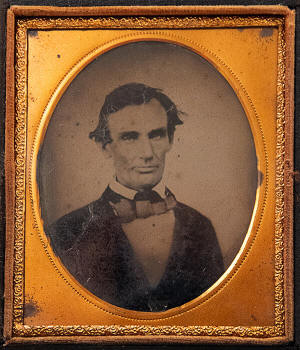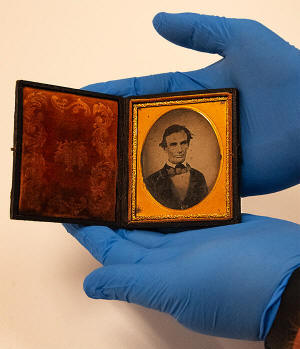|
ALPLM acquires original photo that
Lincoln gave to injured political supporter
Image was made during historic 1858 Senate
race
 Send a link to a friend
Send a link to a friend
[October 02, 2023]
 The
Abraham Lincoln Presidential Library and Museum has acquired an
original photograph that Lincoln gave to a man who had been gravely
injured while preparing for a rally during the historic 1858 U.S.
Senate race. The
Abraham Lincoln Presidential Library and Museum has acquired an
original photograph that Lincoln gave to a man who had been gravely
injured while preparing for a rally during the historic 1858 U.S.
Senate race.
Charles Lame was nearly killed when a cannon went off prematurely
the day before a Lincoln political rally in in Pittsfield, Ill. The
next day, Lincoln arrived, held his rally and then tried to visit
Lame. The doctor would not allow visitors, but Lincoln arranged for
Lame to receive a photo that had been taken that day.
Lame recovered, and his family held onto the photo for generations.
Now his descendants have donated it to the Abraham Lincoln
Presidential Library and Museum so that it will be protected and
shared with the public.

It will be displayed in the museum’s Treasures
Gallery starting Monday, Oct. 2.
“Original images of Abraham Lincoln are extraordinarily rare, and
images with a fascinating back story like this are even more rare.
Lincoln fans everywhere should thank Charles Lame’s descendants for
this generous donation,” said Christina Shutt, executive director of
the Abraham Lincoln Presidential Library and Museum.
The photo is an ambrotype, a negative image on glass.
The images were displayed on black backgrounds. That background
showed through the clear portions of the negative image, creating
the illusion of a black-and-white photo. The oval image is 2 ¾
inches high by 2 ¼ inches wide.
Historian Leroy H. Fischer wrote about Lincoln’s Oct. 1, 1858, visit
to Pittsfield in a 1968 article for the Journal of the Illinois
State Historical Society.
Fischer reports that it was common for political events to include
the boom of unloaded cannons firing. The day before Lincoln spoke,
Lame and another man had been test-firing a cannon. It went off as
Lame was ramming gunpowder into the barrel. The blast burned his
face, and the ramrod went through his arm, ending up embedded in a
tree a block away.
Lame was rushed to his home, where a doctor administered what
treatment he could. The doctor decided not to amputate Lame’s arm, a
dangerous gamble in an era before antibiotics. Infection set in, but
Lame eventually overcame it and recovered. He lived almost 40 years
more, dying in 1897.
The day after the accident, Lincoln delivered a two-hour speech in
the town square, devoting most of his time to condemning his
opponent’s position on slavery. He said Stephen Douglas’s goal was
“to deny the equality of men, and to assert the natural, moral, and
religious right of one class to enslave another.”
Afterward, Lincoln visited the studio of photographer Calvin
Jackson, who made two identical ambrotypes of the 49-year-old
candidate.
Before leaving town, Lincoln stopped by the Lame house to express
his sympathies and tell the family that one of the ambrotypes would
be delivered to them the next day.
[to top of second column] |


“Lincoln’s gift was a small gesture, but it reaffirms
his reputation as a man of compassion. The photo that has so
generously been donated to the ALPLM is a physical reminder of his
kind spirit and concern for others,” said Dr. Ian Hunt, head of
acquisitions for the Abraham Lincoln Presidential Library and
Museum.
The photo was passed down by Lame’s descendants until
it was inherited by Mrs. Mary Davidson of Hendersonville, Tenn. She
passed away in August 2022, and her children decided the image
should come to Springfield, where it could be preserved and enjoyed
by future generations.

The other ambrotype made that day is owned by the
Library of Congress.

The mission of the Abraham Lincoln Presidential
Library and Museum is to inspire civic engagement through the
diverse lens of Illinois history and sharing with the world the life
and legacy of Abraham Lincoln. We pursue this mission through a
combination of rigorous scholarship and high-tech showmanship built
on the bedrock of the ALPLM’s unparalleled collection of historical
materials – roughly 13 million items from all eras of Illinois
history.
For more information, visit
www.President
Lincoln.illinois.gov.
[Christopher Wills] |